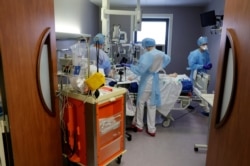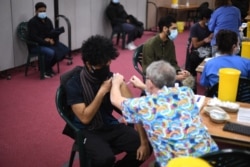Much of Europe has been forced back into lockdown amid a deadly third wave of the coronavirus. In Britain however, pubs, shops and services reopened Monday as the government hailed its vaccination program for cutting infections.
In Rome, around 200 restaurant and business owners staged a protest Monday outside parliament, demanding that the Italian government allows them to reopen.
Lockdown measures, which were originally meant to expire Monday April 12, were extended until May 3 amid a resurgence in coronavirus infections.
“We call on the government to open immediately, respecting the rules and protocols which they have given us several months ago and which we have spent money investing in,” said Saviano Raffaele of the Tuscany Trade Union Association, attending the protest in Rome Monday. “We are tired of this, we need to return to work, we just can’t do it anymore,” said a restaurant owner from the northern Veneto region, who did not want to be named.
Italy has recorded almost 19,000 deaths from the virus since its latest outbreak came to light on February 21, more than any other country. It is one of several European countries struggling with a third wave of the virus.
France, Germany and several other states have extended lockdowns, and German doctors warn that more young people are being hospitalized with the virus.
Chancellor Angela Merkel issued a stark warning Monday. “The number of infections is currently far too high,” Merkel said in a video message at the opening of the trade fair Hannover Messe. “The use of intensive care units in our hospitals is increasing again and we have to say that this third wave might turn out to be the toughest for us. And to break it, of course, the most important weapon we have is the vaccine.”
The European surge is driven by the so-called B.1.1.7 variant of the virus, first identified in Britain, which was hit hard in January and forced back into lockdown.
However, Britain is now bucking the European trend. Pubs, shops and services such as gyms and hair salons reopened Monday, as hospitalizations have fallen to levels last seen in the summer. More than 60 percent of British adults have received a first dose of vaccine and the government said Monday that a first vaccine dose had been offered to the nine most vulnerable groups, including all those aged over 50 and the clinically vulnerable. The country remains on track to vaccinate all adults by the end of July, as long as there is no disruption to supplies of the vaccines.
Professor Anthony Harnden of Britain’s Joint Committee on Vaccination and Immunization said the reopening of the economy was made possible by the success of the vaccine program. “There is a huge wave — third wave — of COVID sweeping Europe at the moment, and that’s in part due to the fact that not a very high proportion of their populations have been vaccinated,” Harnden told Reuters on April 8.
“Vaccination programs are complicated things and they do rely on public confidence and stopping and starting and changing vaccination programs is not an easy thing to do,” Harnden said. “And if you do it, it runs the danger of losing confidence in that program. And so, we are very mindful of that in the U.K. [United Kingdom], so what we are doing — we have not been slow, we are being careful, we are being considered — and we are examining all the data in absolute detail and then making the decisions according to what we see in front of us.”
Polls show public confidence in the Oxford University-AstraZeneca vaccine in Britain is around 75 %. However, a majority of people in France, Germany, Italy, and Spain believe the jab to be unsafe. Confusion over trial data led to the vaccine initially being restricted to people under-65 in some European countries, but in a policy reversal, several countries are now restricting the vaccine to older age groups, after cases of rare blood clots emerged among younger people.
Scientists say the AstraZeneca vaccine remains safe and highly effective. “These (blood clots) are very rare events. They still exist, but we need to balance that against the risk of developing COVID or developing severe disease or even dying from COVID,” said Doctor Peter Drobac, a global health expert at the University of Oxford, who was not involved in the development of the vaccine. “And in most places and for most people, that is a much, much greater risk.”
Europe is trying to boost public confidence. France’s prime minister was given the AstraZeneca vaccine on live television March 19.
After a slow start, inoculation programs are gaining speed across Europe, using vaccines from Pfizer-BioNTech, Moderna, AstraZeneca and Janssen. Germany gave a record 720,000 doses in one day last week, and France administered over half a million doses the same day. Mass vaccination centres have opened at sports stadiums in France and Spain.
“Vaccines are such an important part of the endgame, but we can’t necessarily vaccinate our way out of a surge,” Drobac added. “And so, the vaccination campaign needs to be done aggressively, but also needs to be balanced with other measures to keep the virus in check: masking, social distancing, some of the restrictions on our activities, and of course, testing contact tracing and isolation.”
Europe’s troubled rollout of the AstraZeneca vaccine has implications beyond its own borders, as global public confidence in the drug appears to be falling. The AstraZeneca shot is cheaper and easier to produce than other vaccines, and can be kept at normal refrigerator temperatures, notes Drobac. “That makes it very easy to transport and to store, even to last mile communities around the world. And so, for all of those reasons, I think this vaccine is of utmost importance. It’s kind of the backbone of the global vaccination campaign.”
Drobac fears that some vaccines are being perceived as “inferior,” while others that are seen as more effective could be hoarded by richer countries. “That kind of ‘vaccine apartheid’ if you will, I think could be really difficult, and I do worry about it undermining confidence in low- and middle-income countries where, of course, vaccine uptake is going to be very important.”
The African Union last week cancelled plans to procure the AstraZeneca vaccine, citing a desire to diversify its options. The bloc said the decision was unrelated to concerns over blood clots. Health experts say it could further fuel vaccine hesitancy, and they are calling for global awareness campaigns to counter misinformation.













